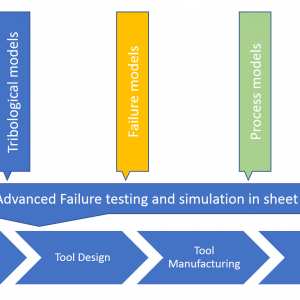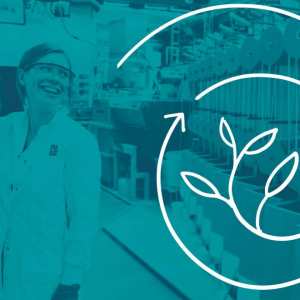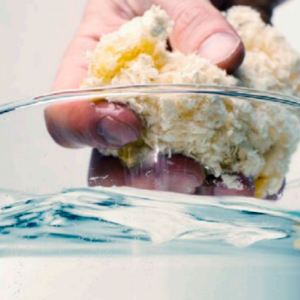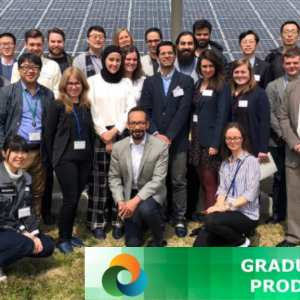Testbed for increased materials flexibility in production
The project created a sustainable test bed that by provides Swedish industry with facilities and tools to physically and virtually evaluate different manufacturing concepts.
2013 – 2016
Project time: 2021 – 2021
Budget: 1 016 500 kronor
A new environmentally friendly process for production of graphene based on equipment normally used in pulp industry
The goal with this project is to develop a new manufacturing process for the two-dimensional material graphene, based on the combination of two manufacturing processes from the pulp industry. We aim for a production method with high sustainability in comparison to the methods commonly used today, the process is water born, with an even lower energy consumption than 2D fabs present process. The project will serve as inspiration how knowledge from a mature industry can be further developed and used in emerging technology areas. Graphene is a two-dimensional nanomaterial (2D-material), with the potential of a multitude of uses in a large number of products. Graphene’s unique material properties have gained a large industrial interest and paved the way for a move from laboratory scale to industrial scale production. How to do the scaling up to sustainable process with high gain and consistent quality is the focus of research-intensive SMEs within the area of graphene globally. This project will increase the Swedish industry´s competitiveness by pushing production of nanomaterials forward, by increasing the machinery industry’s ability to supply equipment to the nanomaterial industry and by putting high quality graphene to market disposal. The incipient industrialisation of graphene has trigged the growing research area 2D-materials. An efficient production method will facilitate production at industrial scale of other types of 2D-material. The project is carried out by a consortium consisting of 2D fab, Valmet, VestaSi (part of the SKF group), Mid Sweden University and the research institute Chalmers Industriteknik. This value chain inspired consortium will strengthen the connection between industry, institute and university.
The project created a sustainable test bed that by provides Swedish industry with facilities and tools to physically and virtually evaluate different manufacturing concepts.
2013 – 2016
Failure prediction for complex load cases in sheet metal forming
2020 – 2023

Resilient and sustainable production for proactive production development of greenfield/brownfield.
2021 – 2024

Urinary incontinence is a common problem that affects everyone from young women who have recently given birth to men who have undergone prostate surgery. Amongst people over the age of 70, almost half of everyone, both women and men, suffer from involuntary urinary leakage.
2021 – 2023

The aim of the present project is to develop a prediction tool for laminated veneer products (LVPs) to make it possible for the industry to improve product performance by reducing rejects and customer complaints and reducing time from idea to market by means of a tool to simulate LVP performance.
2019 – 2021
For more than a hundred years, lubricants for various types of machines have mainly been made from fossil oil. The function has improved over time, but they also have disadvantages; they negatively affect the environment, human health and the climate. The project will therefore work to improve the practical applications by, together with other tests, combining lab tests with field tests.
2021 – 2023

The SQID project will develop an industrial cleaning and drying machine using Qlean water instead of traditional chemicals.
2016 – 2018
Cyclicor, which has its origins at Lund University, has in a previous project within Mistra Innovation successfully developed a method for producing the plastics polycarbonate (PC) and polyurethane (PU) without toxic additives. One goal of the Polyfree 2.0 project is to increase the production of the new plastics from lab scale to quantities that enable the participating industrial companies in turn to take steps towards finished products. Other goals are for the plastics to be recyclable as well as have the required properties.
2021 – 2023

A large number of building boards are used in both construction and furniture manufacturing. They are usually made of sawdust with a formaldehyde-based adhesive as a binder. However, they have some problems, including the fact that shavings absorb moisture and that formaldehyde is both allergenic and potentially carcinogenic. The LigniGC project aims to develop a better alternative.
2021 – 2023

Investigate the preconditions for services on digitalized geometrical metrology. E.g. Mentoring coordination
2018 – 2019
Målet var att förstå de utmaningar som den svenska och japanska industrin står inför studiebesök.
2017 – 2018

Innofacture är en Företagsforskarskola som bedrivs i samverkan mellan Mälardalens högskola och tio av landets största tillverkningsföretag. Projektet fokuserar både på innovation och produktion för att utveckla produktionsprocesser i företagen.
2012 – 2021
Indium is a silvery metal that is very soft and malleable. Together with tin, the metal can be used to create indium tin oxide with properties that make it one of the most important components in the electronics industry. The goal of the project is therefore to build a recycling unit in a continuous production without waste.
2021 – 2023

Urinary incontinence is a common problem that affects everyone, ranging from young women who have recently given birth to men who have undergone prostate surgery. Amongst people over the age of 70, almost half of everyone, both women and men, suffer from involuntary urine leakage.
2021 – 2023
